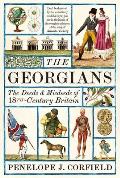Dispatches from an Age of Equipage
The blog of the Yale University Press in London recently featured an essay by Penelope J. Corfield, author of The Georgians: The Deeds and Misdeeds of Eighteenth-Century Britain, that intrigued me.
Corfield is an Emeritus Professor of History at Royal Holloway, University of London, and President of the International Society for Eighteenth-Century Studies.
In this essay Corfield wrote:
Corfield is an Emeritus Professor of History at Royal Holloway, University of London, and President of the International Society for Eighteenth-Century Studies.
In this essay Corfield wrote:
I decided to provide a cultural overview of what people in the eighteenth century thought of their own era. Obviously, the surviving evidence came chiefly from the literate, who were able to record their views – although I also take note of popular songs and sayings. But I searched widely among the less well known and the completely unknown, as well as among the famous. It was the equivalent of tapping into Georgian journalism, both reflecting and trying to influence contemporary attitudes.In this essay, and in her book, Corfield ends up perceiving more optimism than pessimism in eighteenth-century Britain.
And the method that I used was to collect all the eighteenth-century statements that I could find, which took the form of a dictum: ‘It is an age of xxx’ (a common formulation) or a ‘century of xxx’. All these commentaries had to be made in the moment and of the moment. I was not interested (for this purpose) in people’s retrospective verdicts. But I wanted to know what they thought at the time – without any fore-knowledge of the outcome. . . .
A fairly sizable group defined the times in terms of material goods. . . . Thus an onlooker defined the era in 1736 ‘an age of Equipage’ – the smart term for a coach and a team of horses; or in 1756 as ‘this age of Vauxhalls and Ranelaghs’, referring to the new vogue for attending public pleasure gardens.
But much the largest category throughout the collection was the one I classified as ‘mood’. Some of the most frequently repeated claims were those expressing doubt: as in ‘an age of uncertainty’; ‘an age of anxiety’; ‘worrying times’. One British commentator in 1800 was completely woeful: ‘Never was the world in so calamitous or so perilous a state as at this moment’. (Hard not to laugh; but it was written in all seriousness).
Other onlookers, meanwhile, were full of hope, detecting ‘light’; ‘improvement’; even ‘an age in which knowledge is rapidly approaching towards perfection’. (The last quotation came from the philosopher Jeremy Bentham in 1776, when in euphoric vein).


No comments:
Post a Comment